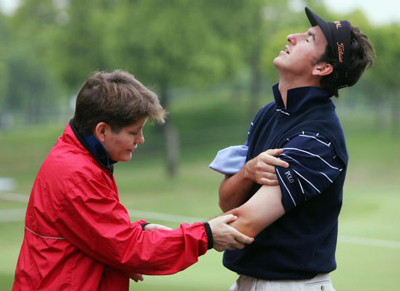Why is it essential to have specialised golf insurance?
Fergus Bisset looks and some of the arguments for taking out golf insurance


When you step onto a golf course you're entering an arena where multiple projectiles are repeatedly being fired in all directions. You then proceed to fire projectiles, probably in multiple directions, with a number of people, houses and cars in the near vicinity. You'll do this for a period of four hours before retiring to the clubhouse for a drink, leaving £2,000 of equipment sitting, unlocked, by the back door.
It would be pretty reckless to undertake such activity without suitable insurance, yet the vast majority of Britain's four million golfers are not sufficiently covered against damage, accident or injury when they take to the fairways. We golfers like to think we're special but I'm afraid, like it or not, we too need to be insured.
Society is becoming more litigious, as extensive advertising confirms and perpetuates. People are increasingly aware of the possibility of seeking compensation through Court and a growing number follow that route. The most compelling reason for taking out specific golf insurance is against personal liability.
In November 2011 Anthony Phee was awarded damages of nearly £400,000 after he lost an eye during a round of golf.
Mr Phee was walking to the 7th tee at Niddry Castle Golf Club, West Lothian in August 2007 when he heard a shout of "Fore." He ducked and put his hand up for protection. While in that position he was struck in the eye.
Mr Phee sued the man who hit the shot, James Gordon, together with Niddry Castle Golf Club. The Court of Session in Edinburgh awarded Mr Phee £397,000 in damages, Lord Brailsford deciding that Mr Gordon was 70% liable and the Golf Club 30% liable.
"I think it was a wake-up call for golfers," said Colin Whitehead, a director of Golf Care, a leading golf insurance provider offering policies to cover golfers for up to £5 million in personal liability. "We estimated then that as few as 1 in 10 golfers were adequately insured."
Get the Golf Monthly Newsletter
Subscribe to the Golf Monthly newsletter to stay up to date with all the latest tour news, equipment news, reviews, head-to-heads and buyer’s guides from our team of experienced experts.
Sean Rowcliffe, an expert in personal injury and litigation and a partner at Hegarty LLP Solicitors, points out the potential repercussions of being found liable in such a case, without suitable insurance.
"In addition to the damages, there would be costs to both sides and, on most occasions, the winning party would be able to recover these," he says. "If the losing party was uninsured and unable to pay the judgement, a Court Order would allow the victim to recover compensation by way of a Charging Order against the individual's property. Possibly then an Order for Sale; the instruction of Bailiffs; the deduction of monies directly from the individual's bank account and/or earnings directly from their employer. So the consequences of being found responsible without suitable funds or insurance in place are potentially life-changing."
Despite the Phee vs Gordon precedent, each golfing case going to Court would be decided on its own merits and no two cases would ever be the same.
"If you play a ball into a green occupied by the group ahead and hit a golfer, you are very likely to be found responsible," says Rowcliffe. "But if you genuinely play a bad shot and have no way of knowing the errant strike could come into contact with other players and shout ‘Fore,' the court would be unlikely to find you responsible."
But there is a large grey area between those two scenarios and this ambiguity should be a compelling reason for golfers to seek adequate cover for personal liability rather than an excuse not to. Another of Golf Care's directors John Woosey sums it up when he says, "When you can be covered for just over £30 a year, why take the risk?"
A strong argument for having adequate cover is a moral one. If you're responsible for an accident at your home club, it's quite likely you might know, even be friends with, the injured party. If you're uninsured, this could present a difficult problem. Does the injured party pursue a claim through the courts knowing the potential financial repercussions for you? If they don't, how would you feel if they suffered a loss of earnings or medical costs as a result of the accident? If properly insured, such a situation would be far less delicate.
There are reasons to be insured for golf other than personal liability. Covering your equipment is one of them.
"We deal with a number of damage claims," says John Woosey. "And, unfortunately, a number of instances of theft. One such settled claim involved an individual who left his clubs in front of a green before going to search for his ball. Whilst his back was turned, someone ran out from the surrounding woodland and made off with his clubs. A claim for just over £1,500 was settled." Specific golf insurance policies will also cover personal accidents on course, damage to third party property (a ball through a car windscreen for instance,) even holes-in-one.
"In December 2012 one of our policy holders scored two holes-in-one during the same round at his home club in Leicestershire" says Colin Whitehead. "Golf Care settled the celebratory bar bill for over £150."
A common belief is that household insurance policies cover personal liability and golf equipment away from home.
In some instances this is the case, but in recent years, "extras" like personal liability have been stripped from many household insurance policies to keep premiums down.
"Many insurers will not include cover for sporting activity and, adding this cover to your home insurance could be significantly more than the cost of a bespoke golfing policy," says Sean Rowcliffe.
"Also, personal liability may be attached to the buildings element of an insurance policy so a person who rents, and has only contents insurance, may not be covered. Insurance cover for loss, or theft, of golf equipment away from the home may not be included. Again you might have to pay an additional sum to your home insurer and, again, this could be more than the cost of a specific golfing policy."
Also, personal liability on your home insurance may only apply to incidents that take place in the insured property (not then on a golf course.)
If you think your household insurance covers you for personal liability on the golf course and/or equipment loss or damage, it might just be worth a careful check of the wording or a conversation with your insurer.
So golfers need suitable insurance, principally to protect themselves against possibly life-changing consequences should they injure someone on the course, and it shouldn't be assumed a home insurance policy covers this. It's also worth considering that a golfing insurance policy will also pay out if you suffer an injury on course, damage someone else's property, lose or break your equipment and even if you score a hole in one.
Look at your monthly outgoings and you'll see insurance payments on your house, car, mobile phone, washing machine, and even your pet. We're used to paying insurance to cover risk. It may be another expense and it may seem unpalatable, but golf is simply a risk we should be covered for.
The GM View:
Changing times
Many golfers think there's an unspoken code that when you set foot on the golf course, the risk of being injured is just part of the game - something you accept. Society doesn't work like that any more. Increased awareness of companies offering the possibility of claiming on a "no win, no fee" basis, means people are now far more likely to pursue compensation through the Court, even if they are golfers. As a result, all golfers need to take out suitable insurance.
Case by Case Each personal liability case that goes to Court will be decided upon its own merits. There will very rarely be any video evidence and often no independent witnesses. The claim will frequently come down to the word of the "responsible" golfer and the individual who has been injured. One thing's certain, a shout of "Fore" is not sufficient to absolve a golfer of responsibility.
The number of cases going to Court where damages are awarded remains very small. However, when they do and the defendant is found liable, compensation payments can be significant. These could be ruinous to an individual without suitable insurance. Is it worth risking it? Probably not. Other insurance
Some home insurance policies might provide cover, but many don't. Don't simply trust you are covered for golf by your household insurance, check the wording of your policy carefully or speak to your insurance firm.
Something else to consider is the excess. If you were to hit someone's car or property and make a claim with your home insurer, there could be a significant excess to pay. In addition, it might well push up your premium the following year.
With policies starting as low as £30 a year, it seems a no-brainer to take out specific golf insurance to give you suitable piece of mind when heading onto the fairways.

Fergus is Golf Monthly's resident expert on the history of the game and has written extensively on that subject. He has also worked with Golf Monthly to produce a podcast series. Called 18 Majors: The Golf History Show it offers new and in-depth perspectives on some of the most important moments in golf's long history. You can find all the details about it here.
He is a golf obsessive and 1-handicapper. Growing up in the North East of Scotland, golf runs through his veins and his passion for the sport was bolstered during his time at St Andrews university studying history. He went on to earn a post graduate diploma from the London School of Journalism. Fergus has worked for Golf Monthly since 2004 and has written two books on the game; "Great Golf Debates" together with Jezz Ellwood of Golf Monthly and the history section of "The Ultimate Golf Book" together with Neil Tappin , also of Golf Monthly.
Fergus once shanked a ball from just over Granny Clark's Wynd on the 18th of the Old Course that struck the St Andrews Golf Club and rebounded into the Valley of Sin, from where he saved par. Who says there's no golfing god?
-
 'This One Is Just As Much His As It Is Mine' - Rory McIlroy Pays Emotional Tribute To 'Big Brother' Harry Diamond After Historic Masters Win
'This One Is Just As Much His As It Is Mine' - Rory McIlroy Pays Emotional Tribute To 'Big Brother' Harry Diamond After Historic Masters WinThe 2025 Masters champion couldn't hold back the tears when discussing the importance of his relationship with caddie Harry Diamond
By Elliott Heath Published
-
 Rory 2.0 Was Born At The 2025 Masters... McIlroy Is Now Free Of His 11-Year Major Burden
Rory 2.0 Was Born At The 2025 Masters... McIlroy Is Now Free Of His 11-Year Major BurdenThe Northern Irishman dug deeper than he ever had to get over the line and finally seal the missing green jacket to his career grand slam puzzle
By Elliott Heath Published